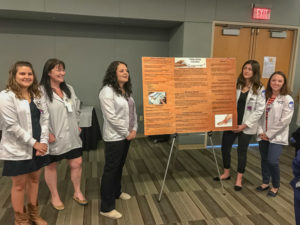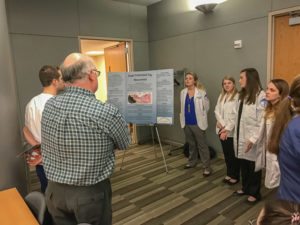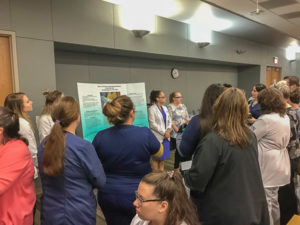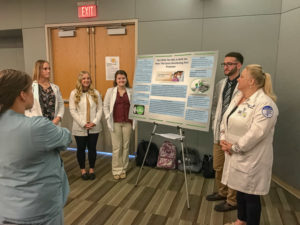Nursing Students Share Research With Engaged UPMC Professionals
Thursday, May 10, 2018
Students in the traditional bachelor’s degree nursing major presented their capstone research at the UPMC Susquehanna research symposium, receiving praise from health system staff and administrators.
The students are enrolled in the course Research and Theory in Clinical Practice, taught by Joni J. Pyle, assistant professor of nursing at Penn College. The students work in clinical groups to formulate a research proposal.
“The proposal is based upon something they see in their clinical experience that they think needs to be studied in greater depth to possibly be ‘changed,’” Pyle said.

 Nineteen students studied four issues:
Nineteen students studied four issues:

 In addition to in-depth on-campus presentations, the groups shared the professional posters they developed to encompass the elements of their research during a small poster presentation at the UPMC Susquehanna symposium. The session was attended by the health system’s nursing administration and nursing staff, including representatives of the research committee at a Pittsburgh-based UPMC campus.
In addition to in-depth on-campus presentations, the groups shared the professional posters they developed to encompass the elements of their research during a small poster presentation at the UPMC Susquehanna symposium. The session was attended by the health system’s nursing administration and nursing staff, including representatives of the research committee at a Pittsburgh-based UPMC campus.
“Students answered staff questions, engaged in academic/research conversation, and were quite professional while doing so. Staff was so engaged,” said Pyle (who also provided the photos). “It was a great experience for the students, as this is how nursing research is generally disseminated.”
She added that it allowed students to see firsthand “that nursing research is a real, living entity in the world of nursing, not simply an academic exercise.”
Participant comments included:
The students are enrolled in the course Research and Theory in Clinical Practice, taught by Joni J. Pyle, assistant professor of nursing at Penn College. The students work in clinical groups to formulate a research proposal.
“The proposal is based upon something they see in their clinical experience that they think needs to be studied in greater depth to possibly be ‘changed,’” Pyle said.

 Nineteen students studied four issues:
Nineteen students studied four issues:- “Measurement of placement of an endotracheal tube” – Shelby D. Lyter, of Allensville; Chloe F. DeVillars, of Bradford; Jessica H. Barchik, of Huntington Mills; Ashley N. Nakach, of Lansdale; and Ashleigh M. Modispaw, of Montoursville.
- “Whether the use of sequential compression devices (SCDs) as compared to use of thromboembolic deterrent stockings (TEDS) affected skin integrity” – Lauren D. Bitting, of Lewistown; Haley C. Francis, of North Bend; Chelsey M. Carnrike, of Williamsport; Kayla J. Woods, of Muncy Valley; and Lauren E. Haus, of Linden.
- “Correct medication administration via a nasogastric tube and why nurses may not follow proper policy/procedure” – Cheyenne M. Felix, of Montgomery; Glendalis Guadarrama, of Avondale; Britney E. Kister, of Winfield; and Abigail J. Miller, of Sunbury.
- “Bacteria growth on the ‘hub’ of a central venous catheter using a Curos disinfecting port protector as compared to bacteria growth if the port is ‘scrubbed’ with an alcohol swab” – Ashlee N. Dick, of Petersburg; Lauryn T. Howe, of York Springs; Timothy M. Osbourne, of Cogan Station; Sarah J. Schick, of Williamsport; and Elizabeth A. Stabley, of Williamsport.

 In addition to in-depth on-campus presentations, the groups shared the professional posters they developed to encompass the elements of their research during a small poster presentation at the UPMC Susquehanna symposium. The session was attended by the health system’s nursing administration and nursing staff, including representatives of the research committee at a Pittsburgh-based UPMC campus.
In addition to in-depth on-campus presentations, the groups shared the professional posters they developed to encompass the elements of their research during a small poster presentation at the UPMC Susquehanna symposium. The session was attended by the health system’s nursing administration and nursing staff, including representatives of the research committee at a Pittsburgh-based UPMC campus.“Students answered staff questions, engaged in academic/research conversation, and were quite professional while doing so. Staff was so engaged,” said Pyle (who also provided the photos). “It was a great experience for the students, as this is how nursing research is generally disseminated.”
She added that it allowed students to see firsthand “that nursing research is a real, living entity in the world of nursing, not simply an academic exercise.”
Participant comments included:
- “Nursing students did an outstanding job presenting their projects.”
- “The posters were well-researched and prepared. The students were knowledgeable of their topics and prepared for our questions. Our future is in good hands!”